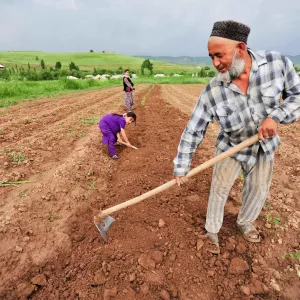Research shifts policy from energy subsidy to water savings in Uzbekistan's irrigated heartland
In Uzbekistan, most agricultural land is irrigated with water pumped from two rivers, the Amu Darya and Syr Darya. This pumping consumes 20% of the country’s power, and to keep power affordable for farmers and other users, the government sinks USD 450 million into energy subsidies every year. Research by the International Water Management Institute (IWMI) and CGIAR Research Program

Research shifts policy from energy subsidy to water savings in Uzbekistan's irrigated heartland
In Uzbekistan, most agricultural land is irrigated with water pumped from two rivers, the Amu Darya and Syr Darya. This pumping consumes 20% of the country’s power, and to keep power affordable for farmers and other users, the government sinks USD 450 million into energy subsidies every year. Research by the International Water Management Institute (IWMI) and CGIAR Research Program on Water, Land and Ecosystems (WLE) has demonstrated an alternative, and led the government to redirect some subsidies towards more efficient irrigation that saves water and energy.
The researchers determined the performance of different irrigation methods under the conditions of the Aral Sea Basin, and found that current practices are energy-inefficient and create return flow, waterlogging and salinity problems. Drip irrigation, however, achieved a 30% saving in water – and therefore pumping energy – while improving yields.
Image credit: Neil Palmer/IWMI

